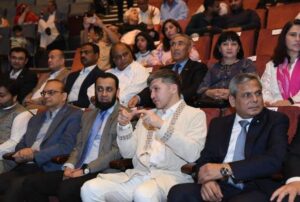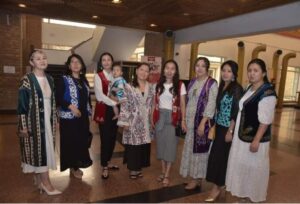ISLAMABAD, May 26 (APP): The Ambassador of Kazakhstan to Pakistan, Yerzhan Kistafin has said that the film “Kazakh Khanate – the Golden Throne” was a wonderful depiction of the glorious past of the Kazakh people and statehood.
The Ambassador was addressing at the screening of the historical film “Kazakh Khanate- the Golden Throne” dubbed in Urdu at the Pakistan National Council of the Arts (PNCA) jointly organized by the Embassy of Kazakhstan in Pakistan, in collaboration with the Pakistan National Council of the Arts (PNCA) here Sunday.

Yerzan Kistafin said that this was the story of the historical struggle for mutual unity and statehood of the Kazakh tribes and today, the dreams of our forefathers, unity and formation as nation had been completed.
The Ambassador said that Pakistan and Kazakhstan were connected in historical religious and cultural relations, which had strong roots in history and we have to make our young generation aware of it.
He said the cultural harmony between Pakistan and Kazakhstan can also improve economic and trade cooperation between the two countries, for which efforts are ongoing on both sides.

The Ambassador of Kazakhstan spoke about the work being through cultural cooperation and announced his intent to organize events on a regular basis in both countries Kazakhstan and Pakistan.
He also mentioned about the plan to sign a Memorandum of Cooperation in the media and information to enhance the cultural integration between both sides.
Kazakh Khanate – Golden Throne is a 2019 Kazakhstani drama film directed by Rustem Abdrashev.
The historical film “Kazakh Khanate- the Golden Throne” was selected as the Kazakhstani entry for the Best International Feature Film at the 92nd Academy Awards, but it was not nominated. The film is the second in a series, which was launched with Diamond Sword in 2017.
Moreover, representatives of official, business, academic, and creative circles of Pakistan were invited to the screening of the film. The guests of the event highly appreciated the work of Kazakh actors in the film industry, noting the commonality of cultures and traditions of our peoples.
It is pertinent to mention that the “Kazak Khanate” was established by Janibek Khan and Kerei Khan in 1465 and both khans came from the Turco-Mongol clan of Tore which traces its lineage to Genghis Khan through dynasty of Jochids.
The Kazakh Khanate, also known as the Kazakh Khanate of the Middle Horde, was a historical state that existed from the 15th century to the 19th century in the territory of present-day Kazakhstan.
The Kazakh Khanate was a confederation of various tribes and clans, and its leadership was not always hereditary, and the title of “Khan” was often held by prominent leaders of the Kazakh tribes who managed to gain authority and recognition among the various Kazakh groups.
The founding leader Janibek Khan (1465–1480) is considered one of the early leaders of the Kazakh Khanate and played a significant role in unifying the Kazakh tribes, while Kasym Khan (1511–1523) was a prominent leader of the Kazakh Khanate who expanded its territory and influence during his reign.
Ablai Khan (1771–1781) also known as Abul Khair Khan, was one of the most famous and influential Khans of the Kazakh Khanate.
He is remembered for his efforts to strengthen the Kazakh state and defend its independence against external threats.

